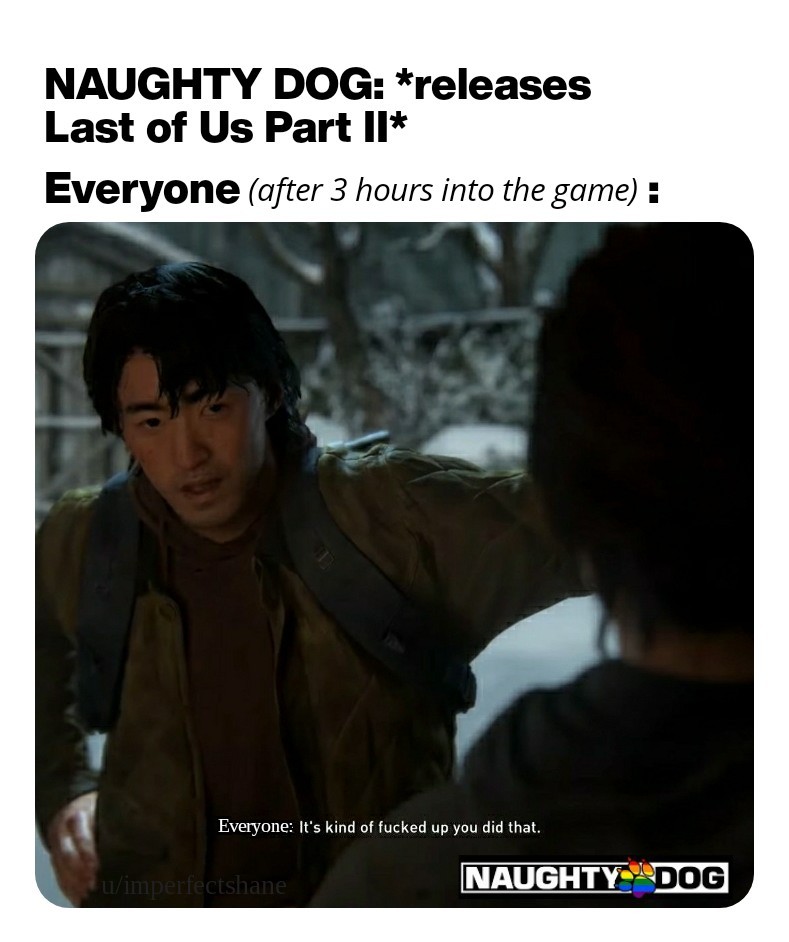

I was expecting to have that choice, and the fact that I didn't actually shocked me. Because I'm so conditioned to make the "heroic" choices in games - the "save the little sister, save the village, Jesus-or-Hitler" binary choice that we always make fun of as gamers.

So I agree with you wholeheartedly, especially regarding the idea of player agency vs. To yell "you can have a blood sample, but you can't have the girl!"īut I'm so, so happy that the game didn't let me. I really wanted to save Ellie and simply threaten the doctor at the end, who was clearly no physical threat to me. I wanted Joel to stop killing everyone who was trying to save the world and find some compromise. I was literally yelling at the screen while playing. There was a utilitarian "moral choice" that was made for you by the Fireflies (to kill Ellie to save the world), and you/Joel cannot accept that.

I'm referring to shooting basically everyone in the final section: the soldiers, the doctor and eventually Joel's killing Marlene (in a cutscene, outside of your "agency" - but in reality, you have no agency in the entire scenario). How about you? How did you read the ending? Also, if you are up for it, how would you feel about me posting this conversation as an opinion piece?ĭanielle: Oh, I think the final hour is brilliant. It's a horror story, right? In the end, Joel's taken this young girl hostage and turned her into his dead child. When Ellie gives Joel the photo of his dead daughter, we think we're witnessing growth, Joel is finally moving on, but what we're really seeing, in hindsight, is Joel completing the projection of his old daughter onto his new one, that Joel is digging deeper into his emotional pit. We've been trained to do that by the lion's share of action games. We misread him, because we think the empathic Joel in the cut scenes is different than the psychopathic Joel we play as. The moment is powerful and absolutely necessary for Joel's final lie to work. You're a participant in the story, but it is not your story to tell. Forcing the player to shoot the doctor is an elegant way of explaining this via action. I believe that if the player has complete control of the story - and I'm talking exclusively about big, cinematic games - then the writer has no control. And the player and hero are having a conversation, reacting and responding to one another, over the course of the journey. The player can steer the action, but ultimately the hero thinks and behaves on his own.
The last of us part 2 memes driver#
I like to think of the player as the driver on a road trip and the hero as the person riding shotgun.

Shame on you for assuming you're this man Forcing you to shoot the doctors - to externalize what's happening inside of Joel's brain - is the writer shouting, "Shame on you for assuming you are this man." It's a smart twist on our expectations from having played hundreds of faceless, characterless heroes in action games.Ī couple weekends back, I attended a lecture by Susan O'Connor - she was a writer on Tomb Raider and BioShock - and she made a really apt point about player agency, that I will surely butcher by paraphrasing: To tell a great story in a AAA game, the player can't be the hero. Sure, you're guiding Joel's external actions, but you have no control of his internal thinking. By the plot's climax, the game's designers needed to emphasize that the wants of Joel and the wants of the player are not the same. (I use scare quotes, because Joel will alternatively stab the lead doctor if you approach him.) I think shooting the doctors is a necessary moment in the player's relationship with the game, and couldn't simply have been another non-interactive violent cut scene. Spoilers ahead.ĭanielle: Okay, okay, so the ending - did it piss you off in the final hour that you/Joel did what you did? I have been dying to talk to people about this game.Ĭhris: Which "ending" are you referring to?Ī number of our colleagues have expressed frustration with having to "shoot the doctors" that are operating on Ellie. In this piece, Senior Reviewer Danielle Riendeau and Editor-at-Large Chris Plante discuss the ending of The Last of Us, along with the game's take on gender and the truth about the game's protagonist, Joel.
The last of us part 2 memes series#
is an opinion series in which two members of Polygon's editorial team discuss an important game or topic.


 0 kommentar(er)
0 kommentar(er)
